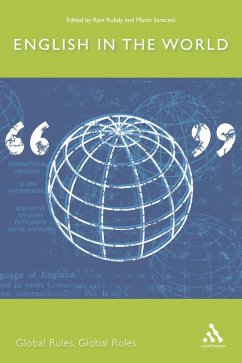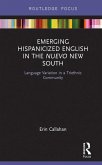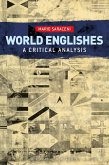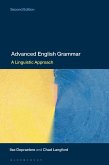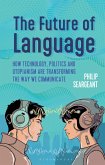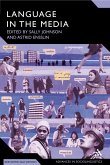75,95 €
inkl. MwSt.
Sofort per Download lieferbar

38 °P sammeln
- Format: PDF
- Merkliste
- Auf die Merkliste
- Bewerten Bewerten
- Teilen
- Produkt teilen
- Produkterinnerung
- Produkterinnerung

Bitte loggen Sie sich zunächst in Ihr Kundenkonto ein oder registrieren Sie sich bei
bücher.de, um das eBook-Abo tolino select nutzen zu können.
Hier können Sie sich einloggen
Hier können Sie sich einloggen
Sie sind bereits eingeloggt. Klicken Sie auf 2. tolino select Abo, um fortzufahren.

Bitte loggen Sie sich zunächst in Ihr Kundenkonto ein oder registrieren Sie sich bei bücher.de, um das eBook-Abo tolino select nutzen zu können.
English today is a truly global language which plays an important role in international communication, trade, diplomacy, sport, science, technology and culture. One of the consequences of the global predominance of English is that non-native speakers of E
- Geräte: PC
- mit Kopierschutz
- eBook Hilfe
- Größe: 11.98MB
Andere Kunden interessierten sich auch für
![Emerging Hispanicized English in the Nuevo New South (eBook, PDF) Emerging Hispanicized English in the Nuevo New South (eBook, PDF)]() Erin CallahanEmerging Hispanicized English in the Nuevo New South (eBook, PDF)22,95 €
Erin CallahanEmerging Hispanicized English in the Nuevo New South (eBook, PDF)22,95 €![World Englishes: A Critical Analysis (eBook, PDF) World Englishes: A Critical Analysis (eBook, PDF)]() Mario SaraceniWorld Englishes: A Critical Analysis (eBook, PDF)31,95 €
Mario SaraceniWorld Englishes: A Critical Analysis (eBook, PDF)31,95 €![Advanced English Grammar (eBook, PDF) Advanced English Grammar (eBook, PDF)]() Ilse DepraetereAdvanced English Grammar (eBook, PDF)27,95 €
Ilse DepraetereAdvanced English Grammar (eBook, PDF)27,95 €![The Future of Language (eBook, PDF) The Future of Language (eBook, PDF)]() Philip SeargeantThe Future of Language (eBook, PDF)16,95 €
Philip SeargeantThe Future of Language (eBook, PDF)16,95 €![Words and the First World War (eBook, PDF) Words and the First World War (eBook, PDF)]() Julian WalkerWords and the First World War (eBook, PDF)16,95 €
Julian WalkerWords and the First World War (eBook, PDF)16,95 €![Language in the Media (eBook, PDF) Language in the Media (eBook, PDF)]() Language in the Media (eBook, PDF)62,95 €
Language in the Media (eBook, PDF)62,95 €![Discourses Surrounding British Widows of the First World War (eBook, PDF) Discourses Surrounding British Widows of the First World War (eBook, PDF)]() Angela SmithDiscourses Surrounding British Widows of the First World War (eBook, PDF)31,95 €
Angela SmithDiscourses Surrounding British Widows of the First World War (eBook, PDF)31,95 €-
-
-
English today is a truly global language which plays an important role in international communication, trade, diplomacy, sport, science, technology and culture. One of the consequences of the global predominance of English is that non-native speakers of E
Produktdetails
- Produktdetails
- Verlag: Bloomsbury eBooks UK
- Seitenzahl: 226
- Erscheinungstermin: 25. März 2006
- Englisch
- ISBN-13: 9781441118493
- Artikelnr.: 40778782
- Verlag: Bloomsbury eBooks UK
- Seitenzahl: 226
- Erscheinungstermin: 25. März 2006
- Englisch
- ISBN-13: 9781441118493
- Artikelnr.: 40778782
- Herstellerkennzeichnung Die Herstellerinformationen sind derzeit nicht verfügbar.
Rani Rubdy is an independent researcher.
Introduction - Rani Rubdy and Mario Saraceni
Part I: Conceptualising EIL
1. An interview with Tom McArthur Rani Rubdy and Mario Saraceni
2. Global intelligibility and local diversity: possibility or paradox?
Jennifer Jenkins, King's College London
3. English as a lingua franca in the expanding circle: what it isn't
Barbara Seidlhofer, Vienna University
4. Defining the 'successful bilingual speaker' of English Luke Prodromou,
freelance teacher
5. Which model of English: Native-speaker, nativised or lingua franca? Andy
Kirkpatrick, Curtin University of Technology, Perth.
6. World Englishes or English as a lingua franca? A view from the
perspective of non-Anglo Englishes Peter Tan, Vincent Ooi and Andy Chiang,
National University of Singapore.
7. Standard English in the World Anthea Fraser Gupta, University of Leeds.
Part II: Pedagogical Implications of EIL
8. EIL curriculum development Sandra McKay, San Francisco State University
9. A multi-dimensional approach to teaching English for the world Brian
Tomlinson, Leeds Metropolitan University
10. Teaching EIL - teaching international or intercultural English? What
teachers should know Nicos Sifakis, Hellenic Open University
11. English as an international language, world Englishes and their
conditions of (im)possibility Ruanni Tupas, National University of
Singapore
12. English in the world does not mean English everywhere: the case for
multilingualism in the ELT/ ESL profession Michael Joseph and Esther
Ramani, University of the North, S Africa
13. An interview with Suresh Canagarajah Rani Rubdy and Mario Saraceni
Part I: Conceptualising EIL
1. An interview with Tom McArthur Rani Rubdy and Mario Saraceni
2. Global intelligibility and local diversity: possibility or paradox?
Jennifer Jenkins, King's College London
3. English as a lingua franca in the expanding circle: what it isn't
Barbara Seidlhofer, Vienna University
4. Defining the 'successful bilingual speaker' of English Luke Prodromou,
freelance teacher
5. Which model of English: Native-speaker, nativised or lingua franca? Andy
Kirkpatrick, Curtin University of Technology, Perth.
6. World Englishes or English as a lingua franca? A view from the
perspective of non-Anglo Englishes Peter Tan, Vincent Ooi and Andy Chiang,
National University of Singapore.
7. Standard English in the World Anthea Fraser Gupta, University of Leeds.
Part II: Pedagogical Implications of EIL
8. EIL curriculum development Sandra McKay, San Francisco State University
9. A multi-dimensional approach to teaching English for the world Brian
Tomlinson, Leeds Metropolitan University
10. Teaching EIL - teaching international or intercultural English? What
teachers should know Nicos Sifakis, Hellenic Open University
11. English as an international language, world Englishes and their
conditions of (im)possibility Ruanni Tupas, National University of
Singapore
12. English in the world does not mean English everywhere: the case for
multilingualism in the ELT/ ESL profession Michael Joseph and Esther
Ramani, University of the North, S Africa
13. An interview with Suresh Canagarajah Rani Rubdy and Mario Saraceni
Introduction - Rani Rubdy and Mario Saraceni
Part I: Conceptualising EIL
1. An interview with Tom McArthur Rani Rubdy and Mario Saraceni
2. Global intelligibility and local diversity: possibility or paradox?
Jennifer Jenkins, King's College London
3. English as a lingua franca in the expanding circle: what it isn't
Barbara Seidlhofer, Vienna University
4. Defining the 'successful bilingual speaker' of English Luke Prodromou,
freelance teacher
5. Which model of English: Native-speaker, nativised or lingua franca? Andy
Kirkpatrick, Curtin University of Technology, Perth.
6. World Englishes or English as a lingua franca? A view from the
perspective of non-Anglo Englishes Peter Tan, Vincent Ooi and Andy Chiang,
National University of Singapore.
7. Standard English in the World Anthea Fraser Gupta, University of Leeds.
Part II: Pedagogical Implications of EIL
8. EIL curriculum development Sandra McKay, San Francisco State University
9. A multi-dimensional approach to teaching English for the world Brian
Tomlinson, Leeds Metropolitan University
10. Teaching EIL - teaching international or intercultural English? What
teachers should know Nicos Sifakis, Hellenic Open University
11. English as an international language, world Englishes and their
conditions of (im)possibility Ruanni Tupas, National University of
Singapore
12. English in the world does not mean English everywhere: the case for
multilingualism in the ELT/ ESL profession Michael Joseph and Esther
Ramani, University of the North, S Africa
13. An interview with Suresh Canagarajah Rani Rubdy and Mario Saraceni
Part I: Conceptualising EIL
1. An interview with Tom McArthur Rani Rubdy and Mario Saraceni
2. Global intelligibility and local diversity: possibility or paradox?
Jennifer Jenkins, King's College London
3. English as a lingua franca in the expanding circle: what it isn't
Barbara Seidlhofer, Vienna University
4. Defining the 'successful bilingual speaker' of English Luke Prodromou,
freelance teacher
5. Which model of English: Native-speaker, nativised or lingua franca? Andy
Kirkpatrick, Curtin University of Technology, Perth.
6. World Englishes or English as a lingua franca? A view from the
perspective of non-Anglo Englishes Peter Tan, Vincent Ooi and Andy Chiang,
National University of Singapore.
7. Standard English in the World Anthea Fraser Gupta, University of Leeds.
Part II: Pedagogical Implications of EIL
8. EIL curriculum development Sandra McKay, San Francisco State University
9. A multi-dimensional approach to teaching English for the world Brian
Tomlinson, Leeds Metropolitan University
10. Teaching EIL - teaching international or intercultural English? What
teachers should know Nicos Sifakis, Hellenic Open University
11. English as an international language, world Englishes and their
conditions of (im)possibility Ruanni Tupas, National University of
Singapore
12. English in the world does not mean English everywhere: the case for
multilingualism in the ELT/ ESL profession Michael Joseph and Esther
Ramani, University of the North, S Africa
13. An interview with Suresh Canagarajah Rani Rubdy and Mario Saraceni
